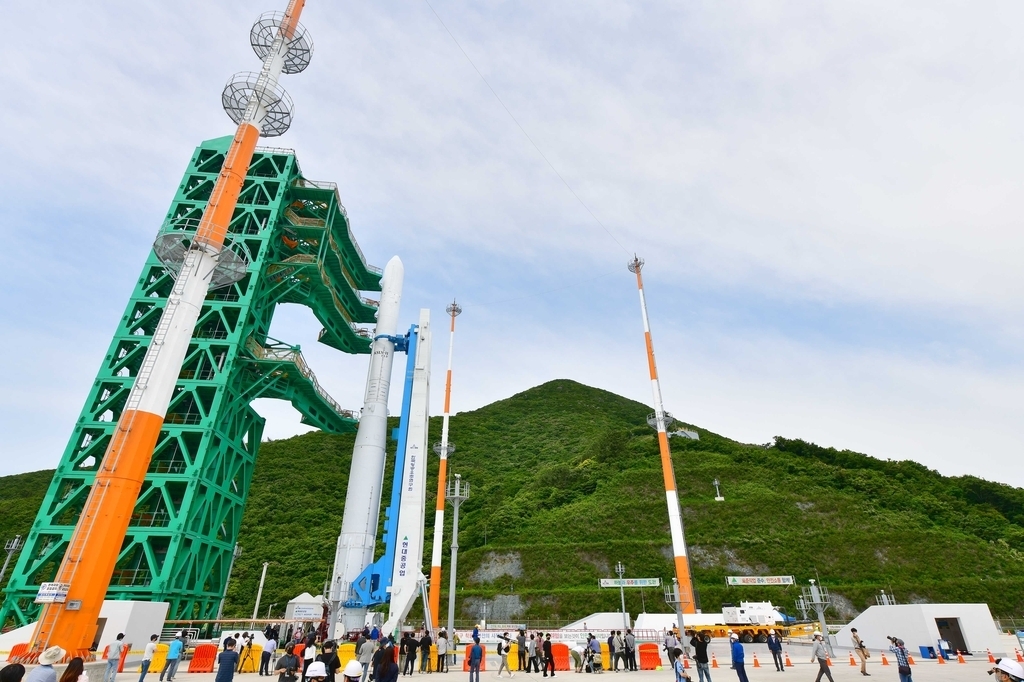Countdown on for S. Korea's self-developed satellite launcher Nuri
By Shim Woo-hyunPublished : Oct. 17, 2021 - 17:37

South Korea will test its first domestically-developed satellite launch vehicle this week, which, if successful, will mark a major step forward in the country’s space program.
The three-stage liquid fuel rocket, also known as Korean Space Launch Vehicle II or the Nuri, will lift off at 4 p.m. on Thursday from the Naro Space Center in Goheung, South Jeolla Province, carrying a 1.5-ton dummy payload.
If all things go well, the payload will enter into low orbit 600 to 800 kilometers above the Earth.
Whether or not the test is a success will likely be known about 16 minutes after the launch, according to Han Sang-yeop, director of the Korea Aerospace Research Institute, which designed the vehicle.
The Nuri, currently undergoing final preparations and checks at a hangar, will be moved to the launch pad, early Wednesday morning.
On launch day, KARI will evacuate the area within 3 kilometers of the launch pad as a safety precaution. The rocket will then be fueled and go through a series of tests for four hours prior to the launch.
The launch time, however, can be adjusted due to weather conditions, which could potentially interfere with the launch. The Nuri rocket has a launch window of about a week.
After its launch, the rocket will be tracked and monitored through radar and telemetry antennas from KARI’s tracking stations located in Goheung, Jeju and Palau.
The Naro Space Center in Goheung is equipped with radar that is capable of locating a rocket until it is 3,000 km away from Earth. The space center also has telemetry antennas that can track its trajectory up to an altitude of 2,000 km.
KARI sees a 30 percent chance of the launch succeeding.
According to KARI, a total of 54 rocket launches have failed over the last 10 years, out of 948 attempts made worldwide.
South Korea launched its first satellite booster Naro in 2013, developed with the help of Russia, after several delays and two failed attempts. Nuri is built entirely with Korea’s own technologies, the KARI said.
The Thursday’s launch is the first of a series of tests planned with Nuri.
KARI has scheduled additional launches in the future.
The country’s space agency said it will continue to make improvements to the rocket for future launches.
If successful, South Korea will become the world’s seventh country with independent capabilities to launch a satellite over 1 ton into orbit from its own soil.
The South Korean government has invested a total of 2 trillion won ($1.6 billion) over the past 12 years. Around 500 researchers from 300 local firms have joined the project to date.
Meanwhile, the Science Ministry said Sunday that no on-site spectators will be allowed at Naro Space Center, due to safety issues and the pandemic situation. The launch will be livestreamed on various platforms, including YouTube, it added.








![[Graphic News] More Koreans say they plan long-distance trips this year](http://res.heraldm.com/phpwas/restmb_idxmake.php?idx=644&simg=/content/image/2024/04/17/20240417050828_0.gif&u=)
![[KH Explains] Hyundai's full hybrid edge to pay off amid slow transition to pure EVs](http://res.heraldm.com/phpwas/restmb_idxmake.php?idx=644&simg=/content/image/2024/04/18/20240418050645_0.jpg&u=20240419100350)








![[KH Explains] Hyundai's full hybrid edge to pay off amid slow transition to pure EVs](http://res.heraldm.com/phpwas/restmb_idxmake.php?idx=652&simg=/content/image/2024/04/18/20240418050645_0.jpg&u=20240419100350)

![[Today’s K-pop] Illit drops debut single remix](http://res.heraldm.com/phpwas/restmb_idxmake.php?idx=642&simg=/content/image/2024/04/19/20240419050612_0.jpg&u=)